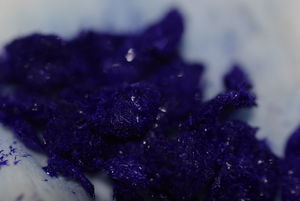Tetraaminecopper(II) persulphate
 Tetraamminecopper(II) persulphate crystals.
| |
| Names | |
|---|---|
| Other names
TACP
Tetraaminecopper(II) persulfate | |
| Properties | |
| [Cu(NH3)4(H2O)2]S2O8 | |
| Molar mass | 359.82 g/mol |
| Appearance | Blue purple solid |
| Poorly soluble | |
| Solubility | Insoluble in hydrocarbons |
| Hazards | |
| Safety data sheet | None |
| Except where otherwise noted, data are given for materials in their standard state (at 25 °C [77 °F], 100 kPa). | |
| Infobox references | |
Tetraamminecopper(II) persulfate or tetraamminecopper(II) persulphate (sometimes shortened to TACP) is a very weak primary explosive with a very short shelf life.
Contents
[hide]Properties
Chemical compounds
TACP will decompose violently when heated.
Physical
TACP is a blue-purple solid, poorly soluble in water.
Explosive
TACP is a weak primary explosive, which explodes when dry. It has moderate sensitivity to shock, but heat will cause it to detonate.
Production
If solutions of ammonium persulfate and tetraamminecopper(II) sulfate are cooled and then mixed, bright purple crystals of the TACPs will settle out. These should be filtered and dried as quickly as possible, as the solid will completely break down into a unknown green solid with no energetic properties in a few hours.
This decomposition may be a reaction with water but is more likely to be a loss of ammonia from the structure.
Projects
- Make primary explosive
Handling
Safety
TACP will decompose to release ammonia gas, which is an irritant.
Storage
Tetraamminecopper(II) persulphate will quickly break down and cannot be stored for long periods of time. It decomposes completely after 6 months.
Disposal
Dispose it like every other copper ammonia complex.